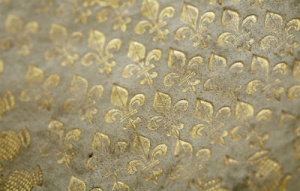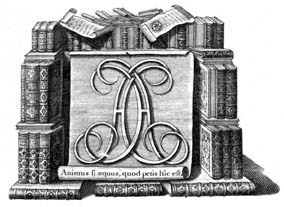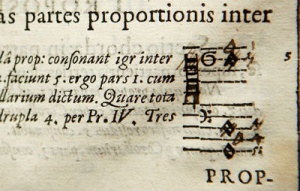Kepler’s Harmonices Mundi

Fig.1 fleur de lys and thistles
The astronomer and mathematician Johannes Kepler (1571-1630) published his Harmonices Mundi in Linz, Austria, in 1619. The title translates as the Harmony of the Worlds. This important work details Kepler’s expansion of the theory, popular with medieval philosophers, which suggested that musical harmonies exist within the positions of the planets. The musical theory provided astronomers and philosophers with a rational explanation for the arrangement of the heavenly bodies. Kepler updated the theory by proposing that the harmony was produced, not just by the planets’ positions, but by the relationship between the distances of the planets from the sun to their orbital periods. Kepler thought that very occasionally, and possibly not since the time of creation, all of the planets “sang” together in perfect harmony.

Fig.2 Engraved bookplate
Kepler dedicated Harmonices Mundi to King James VI of Scotland and I of England. This particular copy is sumptuously bound in parchment with the coat of arms of King James surrounded by fleur de lys and thistles, all tooled in gold (Fig.1,above ). The binding suggests that the book was part of the Royal Collection at one time, and it is possible that this is the copy that Kepler presented to the King. As the Royal Library is still very much intact, the next question is how the volume ended up at Univ rather than Windsor. On the inside of the cover there is an engraved bookplate (Fig.2, right) which, while providing a clue, doesn’t tell the whole story. The bookplate belongs to Arthur Charlett who was Master of Univ from 1692-1722. In 1697, while serving as Master, Charlett was appointed a royal chaplain. The most creditable scenario is that the volume was presented to Charlett as a gift from the Royal Household.

Fig.3 Musical notation
Fig.3, left shows an example of the musical notation in the volume, some of which has been amended by hand. If this is the copy which Kepler presented to the King it is conceivable that the corrections are in the hand of the author. Who else would have presumed to correct his work?
Univ D.105.1
Published: 13 April 2014
Further selected Univ Treasures are detailed below or explore the whole collection on our News and Features Treasures pages.
